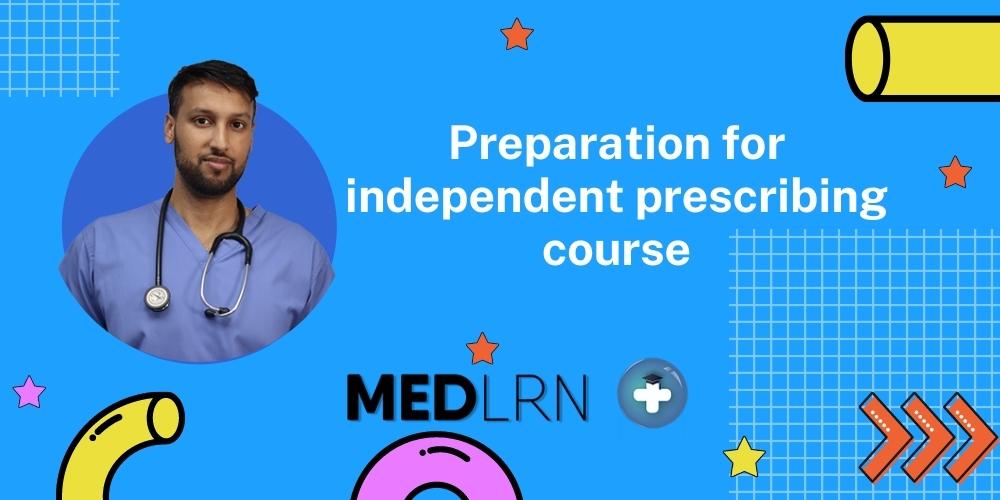Preparation is the key to success, and a lack of it is preparation for failure.
Faheem Ahmed, award-winning pharmacist
If only I knew. When I started my independent prescribing course, I had no idea what to expect or prepare for the course. I struggled with academic study at the time and underestimated the course. But, you don’t need to make these mistakes- so continue reading and benefit from my mistakes- lucky you!
We are helping pharmacists to find a DMP to be independent prescriber pharmacists. Contact us now to match you with a DMP.
What is course length of an independent prescribing course?
I intend to discuss a range of factors that you should consider before beginning the pharmacist independent prescribing (IP) course- not in any particular order – with the first consideration being the course duration.
Essentially, you need to decide if you want to complete your independent prescribing course within six months or four months? That is a crucial decision because the shorter the duration, the greater the intensity and investment of time it will require from you- remember, time is something you can never get back. Hence, it would be best if you used it efficiently.
Although a 4-month course is shorter, I would recommend avoiding this. If you’re wondering why I do not recommend a fast-track course, then explain why.
Remember the saying; the grass is not always greener on the other side; while a four-month course is enticing, it will require you to commit more of your time within a short period, which can be intense and very stressful.
And, if you’re like me, working full-time and juggling a family – which can be very stressful- then saving two months at the expense of added pressure doesn’t sound like a worthwhile investment.
Which university to go for an independent prescribing course?
So how do you decide? Well, firstly, make sure the university you are considering is accredited by the General Pharmaceutical Council (GPC) to provide the pharmacist independent prescribing course – you can find a list of universities accredited on the GPC website.
Once you have a list of accredited universities, consider the following;
- do they offer a course that meets your time scales, i.e., a six-month or four-month course?;
- do they have a school of pharmacy? – I feel this is important because if they have a school of pharmacy, then they will have experience teaching pharmacists and possibly be better equipped;
- does the university offer distance learning? – more on this later;
- the course costs- most courses cost between £2,000-£3,500, but when you factor in travel time and days of work for study, then the course can end up costing upwards of £4000;
- previous student reviews- always useful.
The course itself
Honestly, this can vary from university to university. But what is expected in all the courses is; (1) essay writing- this was not my strong suit. However, to improve your writing, you need to write and read more often. In addition, I would recommend that you brush up on referencing because this will be expected; (2) reflection on practice – critical. From a practical perspective, this is a crucial and skill you must make a habit of. The Gibbs cycle of reflection is a good starting point; (3) exams- not all universities require pharmacists to sit numeracy tests now. Instead, the focus tends to be on clinical skills tested through Objective Structured Clinical Examination (OSCE) stations.
The OSCE stations include; (1) how to take a patient history; (2) how to measure vitals such as blood pressure, heart rate, respiratory rate, and oxygen saturation levels ; (3) examination of body systems. By the way, they will expect you to relate the findings to disease and not just regurgitate parrot-fashion.
If you’re wondering how to best prepare for the OSCE stations, I would suggest the following text; Bickley, L. (2017) Bates’ Guide to Physical to Physical Examination and History Taking (12th Ed). Philadelphia: Lippincott, Williams, Wilkins.
If you think it ends here – then you’re wrong. During the independent prescribing course, you will also be required to; (1) map across the RPS framework competencies- here, you will have a set of standards and will be required to demonstrate how you meet these. I would advise you to speak with your tutor to provide you with some examples before you begin. And finally (2) submit a practice log- this is where you list the various activities you have undertaken, including time and date, to ensure you meet the 90 hours supervision required.
Final tips
At this point, you may be overwhelmed. And I don’t blame you because it’s a lot. But if you pace yourself, you can’t go wrong.
I would recommend dedicated 20-30 minutes a day to the academic side of things, and you will have a great course- trust me.








Hi
I am undertaking a Pharmacist independent prescribing course and I looking for a DMP/DPP to act as a mentor .
Would you be able to help ?
I am looking in the Grays,Essex area.
Many thanks
K